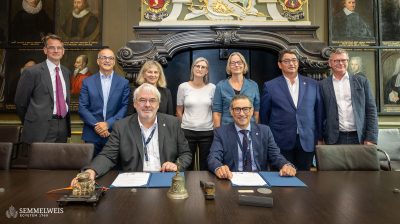A delegation of North Sichuan Medical College, Southwest Medical University and Chengdu University of Traditional Chinese Medicine was received by the Directorate of International Relations. The institutions from Sichuan Province, People’s Republic of China, were able to visit our university thanks to the Sino-European Foundation for Chinese Culture and Education.
After a short introduction, Dr. Judit Vadlövő, project coordinator at the Directorate of International Relations, spoke about the importance of the Chinese relations of Semmelweis University and presented the university with a special emphasis on the international relations of the institution. In the framework of the presentation, Katalin F. Tóth, institutional Erasmus+ coordinator, introduced the Erasmus+ and Erasmus+ International Credit Mobility Programmes to the Chinese delegation. After the presentation, Yao Hongwu, international director of Chengdu University of Traditional Chinese Medicine, introduced his institution. He emphasized that, in addition to acupuncture, their students have the possibility to learn about Chinese herbs; furthermore, they also educate nurses, as they consider it important that nurses skilled in acupuncture work in health care. Their medical education lasts five, their pharmacy training four years, and at the university 22,000 students are educated by 2000 teachers. Last year, five students and five teachers participated in the Erasmus+ International Credit Mobility Program, said Yao Hongwu, and suggested that Hungarian students should also attend the summer university of Chengdu University of Traditional Chinese Medicine, where young people would also have the possibility to be introduced to Chinese culture.
The introduction of North Sichuan Medical College and Southwest Medical University revealed that not only traditional Chinese medicine but also Western medicine are taught in the institutions, and they try to develop integrative medicine. Zhang Xilin, representative of Southwest Medical University, said they see a great opportunity in teacher exchange, and they consider it important that teachers also have the opportunity to gain experience abroad and participate in scientific research.
The representatives of the universities were primarily interested in student and teacher exchange as well as postgraduate education. However, they stated that despite the existing Chinese state scholarships, few students have applied abroad in recent years due to linguistic constraints. The members of the delegation were pleased to note that many courses at Semmelweis University are available in English.
Source and photo: Directorate of International Relations
Translation: Diána Módos


